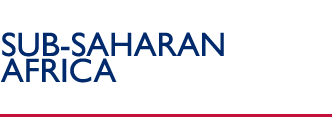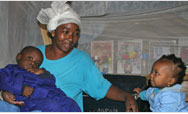Sub-Saharan Africa
Overview of U.S. Foreign Assistance to Africa
The U.S. Government provides assistance to 47 countries in Africa, and USAID operates 23 bilateral missions on the continent. Three regional missions support activities in countries with a limited USAID presence and manage programs that strengthen institutional capacity to contribute to stable and secure development in Africa.
U.S. foreign assistance supports the overall goal of transformational diplomacy: to help build sustained and well-governed states that respond to the needs of their people, reduce widespread poverty, and conduct themselves responsibly in the international system. USAID assistance to Africa works to help African governments, institutions, and organizations incorporate good governance principles and innovative approaches to health, education, economic growth, agriculture, and the environment.
U.S. Priorities in Africa
* Enhance strategic partnerships
* Consolidate democratic transitions
* Bolster fragile states
* Strengthen regional and sub-regional organizations
* Strengthen regional security capacity
* Strengthen Africa counterterrorism cooperation and capacity
* Stimulate Africa's economic development and growth
* Implement presidential initiatives
* Focus on humanitarian and development assistance programs
To support the goal of transformational diplomacy and specific development priorities, U.S. assistance to Africa has four over-arching objectives.
Governing Justly and Democratically
To enhance stability and increase the capacity of governments to govern justly, the United States provides support to strengthen Africa's democratic institutions, professionalize security forces, and promote key reforms. Resources also provide assistance and build African states' resolve to fight corruption and work closely with civil society organizations as emerging constituencies for reform, helping African citizens to hold their governments accountable. Resources also improve the administration of justice for victims of domestic violence as part of the Women's Justice and Empowerment Initiative, which seeks to help the governments of Benin, Kenya, South Africa, and Zambia improve their ability to investigate, prosecute, and adjudicate gender-based violence and provide support to victims.
Investing in People
Africa is the primary focus of the President's Emergency Plan for AIDS Relief (PEPFAR), which provides significant funding to African countries experiencing the most serious effects of the HIV/AIDS pandemic. Through the President's Malaria Initiative, prevention and treatment initiatives are being expanded with the goal of reducing mortality by half in target countries. Through the Africa Education Initiative, USAID aims to increase access to quality education by supporting training of new teachers and providing textbooks and scholarships for children. Funds will also support water and sanitation development and conservation programs such as the Congo Basin Forest Partnership .
Economic Growth
Africa's economic growth and fiscal balance indicators demonstrate a gap between its present stage of development and that of the average for the world's developing countries. Efforts to address this disparity focus on stimulating private sector development, increasing African trade competitiveness, and integrating African nations in the global economy. Building on the success of the African Growth and Opportunity Act, diplomatic and development resources help facilitate increased cross-border, regional, and international trade. To break the cycle of recurrent food crises, USAID uses the Africa Global Competitiveness Initiative and the Initiative to End Hunger in Africa to encourage agricultural and economic growth in partnership with other donors and regional African organizations.
Humanitarian Assistance
USAID works to both prevent and respond to humanitarian crises across the continent. While activities vary across regions, the U.S. seeks to raise awareness and support for improved disaster preparedness, mitigation, and response capacity.
Back to Top ^
|


